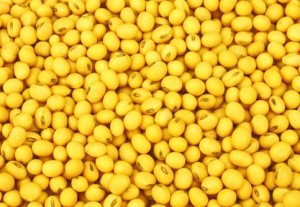
Soy isoflavones are phytochemical constituents of soybeans, a legume that has served as the basis for various foods in many Southeast Asian countries for thousands of years. The major isoflavones in soy are genistein and daidzein. Soyfoods also contain other valuable constituents, including protein, saponins, and phytosterols.
Contents
Uses
Used for menopause syndromes.
Benefits
Isoflavones may reduce the risk of hormone-dependent cancers, such as breast and prostate cancer, as well as other cancers. A review study of soy research found that 65 percent of 26 animal-based cancer studies showed a protective effect of soy or soy isoflavones. Human research and population studies also suggest that soy can protect against cancer as well as heart disease. The mild estrogen activity of soy isoflavones may ease menopause symptoms for some women, without creating estrogen-related problems, and may help regulate hormone levels in premenopausal women. Soy isoflavones may also play a beneficial role in preventing osteoporosis and autoimmune conditions.
A number of new studies have confirmed anti-cancer effects, more so for genistein than daidzein. Studies have also determined that soy isoflavones can help prevent bone-loss when calcium is deficient, and they can improve blood fat and cholesterol profiles and thus reduce the risk of heart disease.
Two particularly important isoflavones in soy – genistein and daidzein – appear to protect against hormone-related disorders such as breast cancer and endometriosis. They do this by competing for the same place on cells (receptor sites) that the body’s own estrogen does. Some of the risks of excess estrogen, including breast and uterine cancer, can apparently be lowered in this way.
Similarly, when the body’s natural levels of estrogen drop, as they do with menopause, soy isoflavones can compensate by binding to some of the cell receptor sites that estrogen once did. Menopausal symptoms may improve as a result.
Research findings suggest that soy isoflavones may also inhibit cancer-causing enzymes, provide antioxidant protection, and enhance the immune system.
Specifically, soy isoflavones may help to:
Control symptoms of menopause and perimenopause. When regularly ingested, soy may reduce the frequency and severity of hot flashes and other menopausal difficulties. In one study, women who added 45 grams of soy flour to their daily diet experienced a 40% reduction in hot flashes. The isoflavones in soy are believed to be responsible for these effects.
Guard against osteoporosis. Soy isoflavones may aid women (and men) in maintaining bone mineral density.
One study of postmenopausal women found that consuming 40 grams of soy protein a day resulted in a significant increase in bone mineral density in the spine, an area often weakened by osteoporosis. If the spine is weak, stooped posture and myriad complications may develop.
Counteract the effects of endometriosis. The phytoestrogens in soy products may help to offset the action of the body’s natural estrogen, which is often responsible for instigating the monthly pain, heavy bleeding, and other symptoms of endometriosis.
Protect against prostate problems. Eating soy products may protect against enlargement of the male prostate gland. The size of the prostate gland tends to increase with age, causing various types of urinary difficulties, including frequent nighttime awakenings.
Prevent various cancers. Preliminary studies show that regular consumption of soy foods or supplements may protect against hormone-related cancers of the breast, prostate, and endometrium. According to one study, women who ate the most soy products and other foods rich in phytoestrogens reduced their risk of endometrial cancer by 54%.
Integrating soy products may be especially important for women who have never been pregnant. One analysis found that women in this category who consumed little, if any, soy–less than a quarter ounce in a given day, on average–were at four times the risk for developing endometrial cancer. In animal studies, adding soy protein to the diet significantly reduced tumor formation and the likelihood that cancer, once developed, would spread. So even though more research is needed on soy’s cancer-fighting properties, researchers are hopeful. They speculate that the isoflavone genistein may block a protein called tyrosine kinase, which promotes the growth and proliferation of tumor cells.
Reduce heart disease risk. Heart-healthy actions have been attributed to isoflavone-rich soy. In 1999 the Food and Drug Administration declared that soy foods can be billed as products that reduce the risk of heart disease by lowering harmful cholesterol.
Specifically, soy products have been shown to lower LDL (“bad”) cholesterol and significantly increase HDL (“good”) cholesterol
Cautions
- Persons with estrogen dependent cancers should consult a healthcare professional before beginning a soy regimen. Keep out of reach of children.Do not exceed recommended dose. When using nutritional supplements, please consult with your physician if you are undergoing treatment for a medical condition or if you are pregnant or lactating.
Interactions
- Not enough information is available.
Other names
n/a
References
Source: Organic-herb, WiseGeek
Needs.com, http://www.needs.com/product/LifeExtension_Super_Absorbable_Soy_Isoflavones_60/htc_Soy_Extract
